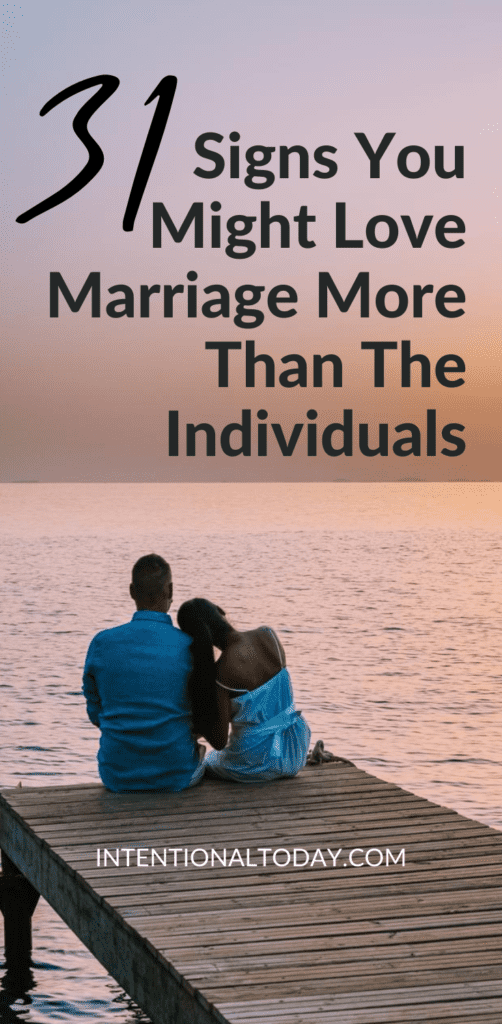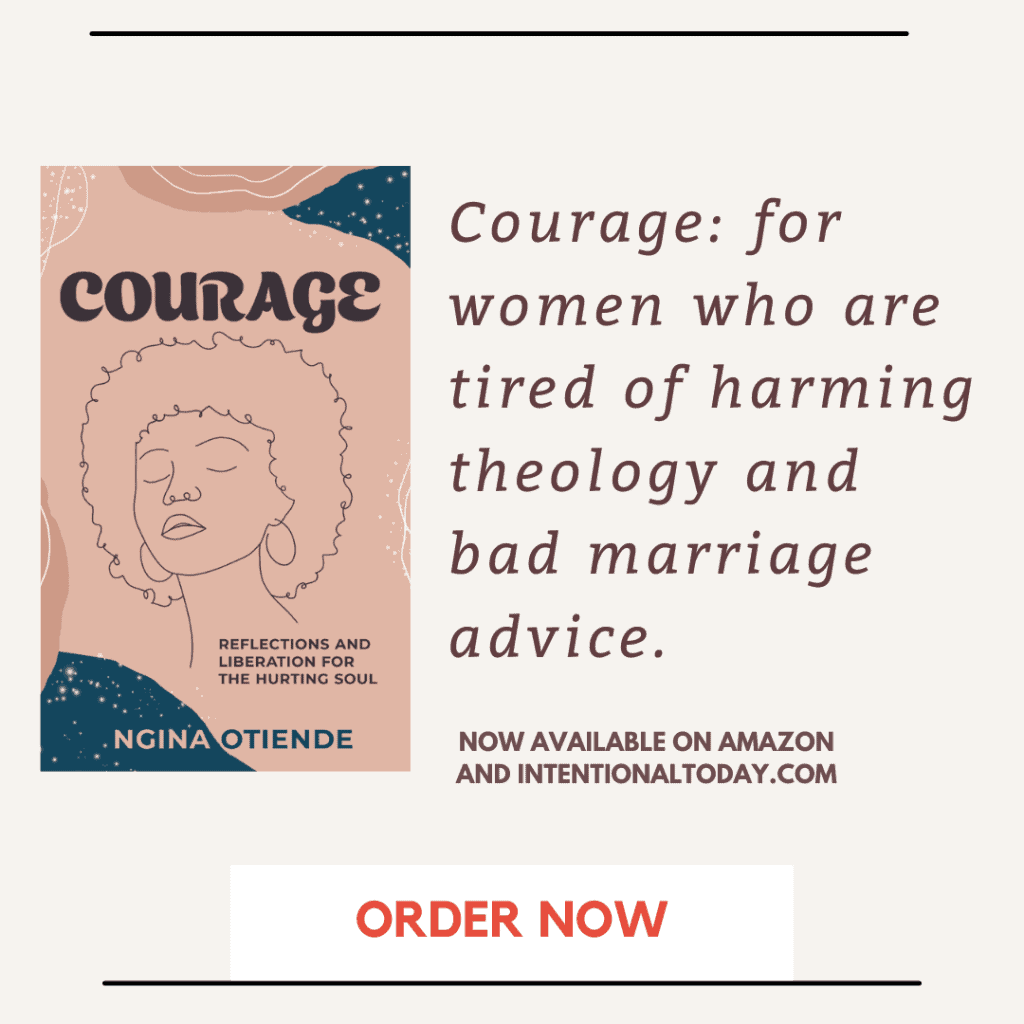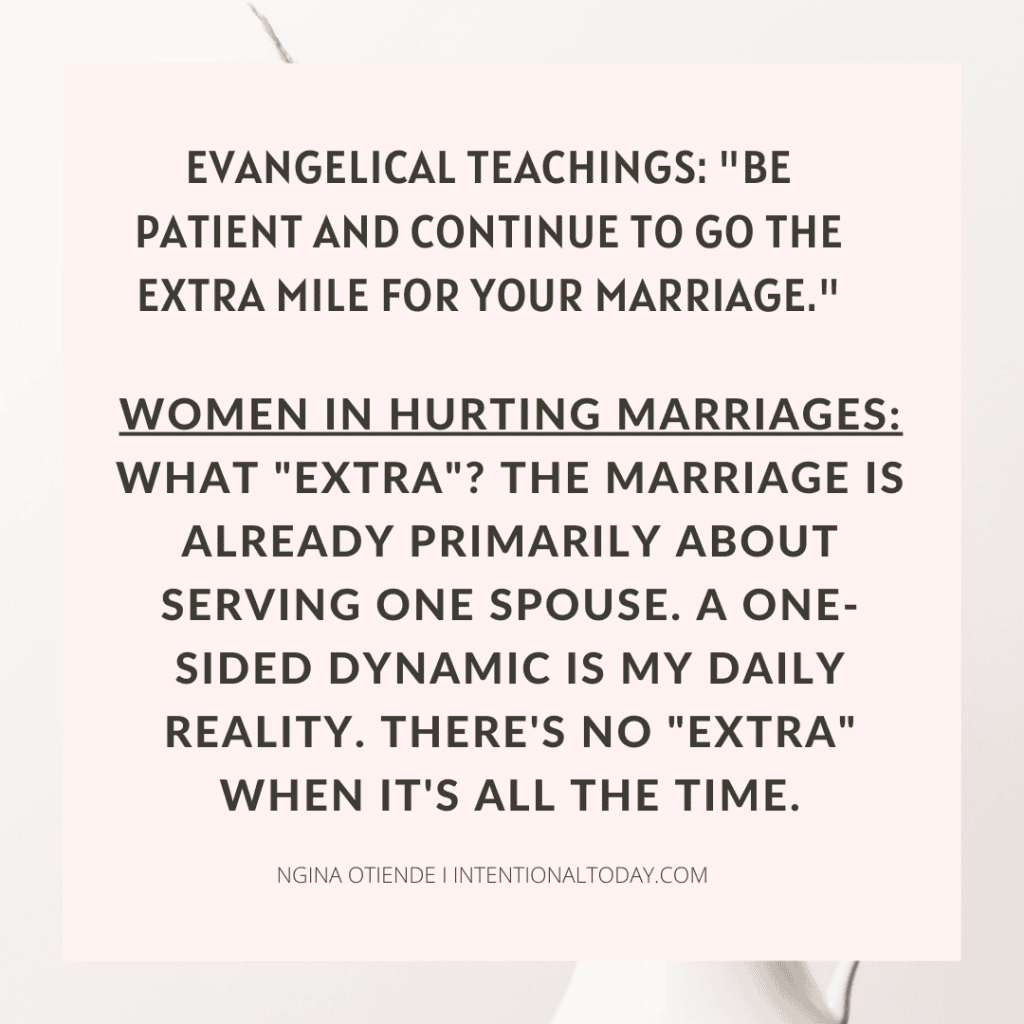31 Signs You Might Love Marriage More Than The Welfare of The Individuals
Do we love marriage more than people?
Sometimes, how we talk about marriage gives the impression that the institution of marriage is more important than the welfare of the individuals.
Recently, I decided that I love people more than the institution of marriage and gave some leg to my beliefs. Of course, I’ve always loved people, but I never realized how my approach to marriage teaching left a swath of individuals feeling unheard, and unseen.

I still love marriage and will continue to talk about how to create a healthy marriage where both spouses are honored, respected, and fulfilled. But I’ll also talk about unhealthy dynamics and shed light on areas we can do better.
I believe my perspective is in line with Scripture. Jesus consistently opposed those who turned their relationship with God into an entire religious performance, such as the Pharisees and teachers of the law.
To those folk, the appearance of godliness (keeping the Mosaic law, for example) was more important than having an actual relationship with God. So they dismissed the Christ, Immanuel, in favor of law and traditions.
Christians encounter a similar issue when they prioritize institutions over the core values of God. We talk about the sacredness of marriage or how “God loves marriage” and forget that God loves people always.
When individuals remove health from the equation (through toxic harming behavior, chronic immaturity, and unrepentance) and think they can still have a marriage, they need to be called out. Those dynamics and behaviors need to be called out so people don’t think they are representative of the heart of God.
I love marriage! And it’s okay to value a healthy marriage. But it is unfair to love marriage so much that we become blind to the plight of those harmed by unhealthy spouses and erroneous teachings and beliefs.
So how do we know we have love marriage more than people? Recently on Facebook, I shared a few signs of an unhealthy attachment to marriage. And asked the community to add their thoughts.
So I thought to put all our thoughts in one blog post for easy reference and sharing (please share the post with your friends and community so we can spread the word!) Let’s talk about the signs we love marriage more than people. (Or we might love marriage more than the welfare of the people in it.)
31 Signs You Might Love Marriage More Than Than The Individuals In It
1. When your only instinct is to reconcile a couple, not check up on their individual health.
We believe (rightly so) that marriage is sacred. As a result, our approach is to keep couples together, no matter the cost.
But that strategy is harmful because not every married individual considers their marriage sacred. That’s why abuse, chronic neglect, betrayal and unrepentant behaviors exist. Read More Dealing With a Chronically Irresponsible Spouse (Clarity for Wives)
2. When you believe in no divorce or divorce for infidelity only.
Some churches will go as far as asking married couples to commit to a no-divorce policy.
That approach would work if we lived in this idealistic world where individuals don’t break their vows. We shouldn’t ask people to be committing to a no-divorce policy.
Instead, we should be asking them to commit to avoiding the issues that lead to divorce. Like, don’t abuse your spouse. Don’t neglect each other’s needs. Get help for addictions (and commit to the healing journey.) Don’t engage in criminal behavior. Read More The Problem With Churches Asking Couples to Commit to “No Divorce”
Let’s stop putting the cart before the horse. And remember that Scripture allows divorce for more than infidelity.

3. When you believe the marriage institution is under severe attack and we should do everything to keep people together.
For the longest time, I was CampLetsProtectMarriages.
This is what I wrote about it recently.
“I was really protective of marriage in general, believing that many spouses don’t take their vows seriously. Now I know that most people of faith will fight for their marriages long after they should have stopped fighting. Frivolous divorces exist, but there isn’t an epidemic of frivolousness. The actual epidemic seems to be the church’s silence about abuse and consequences of unrepentant sin in relationships. A big problem is God’s people propping up erroneous teachings of marriage first, instead of individual welfare first.” Ngina Otiende, Why I’ve Deleted My Books, Courses, and Over 200 Blog Posts
Research shows that most divorces are life-saving. Some people who should not be married will continue getting married. Notwithstanding, our goal should never be to prevent divorce.
It should be to ensure marriages are healthy and safe and to provide support and help for those who need to escape a harmful vortex.
4. When you sideline and side-eye women and men who have left their abusive, toxic, controlling, chronically unrepentant, unavailable spouses.
Sidelining divorced individuals reveals our own prejudice and toxic beliefs.

5. When you permanently remove divorced people from leadership positions and service in the church.
One Facebook commenter shared her story: “I was heartbroken when my physically abusive alcoholic husband left me after ten years of marriage and I found out I couldn’t be in ministry because of it. I was also considered an adulterer when I got remarried..”
Beyond heartbreaking.
6. When you believe that most divorces happen for frivolous reasons like “falling out of love.”
Statistics say most divorces, especially amongst people of faith, happen for life-saving reasons, not for frivolous ones. Read More Christian Women Are Not Escaping Healthy Marriages
7. When you consider people who call out unhealthy marriage messages divisive and enemies of the faith.
People who call out unhealthy teachings and marriages have been labeled angry, vengeful, hurt, divisive, anti-marriage, anti-faith, Jezebels and all kinds of names.
And I find that ironic because caring for the wounded and hurting and doing everything within its power to prevent abuse should be the goal of the church of Jesus Christ.
8. When you’re happily married and want to champion healthy marriages..
But are unwilling to step outside your healthy-marriage-silo and learn about abuse, trauma, controlling, and abandoning spouses. Read More What Healthy Couples Need to Know About Destructive Marriages
9. When “God hates divorce,” forms your entire theology on divorce and marriage.
Many scholars agree that the original text in Malachi 2:16 did not read “God hates divorce.”
Some Bible translations are going back to the original text. E.g., the ESV currently reads “For the man who does not love his wife but divorces her, says the Lord, the God of Israel, covers his garment with violence, says the Lord of hosts. So guard yourselves in your spirit, and do not be faithless.” Read More Does God Hate Divorce?
More signs you might love marriage more than the welfare of the individuals.
With thanks to all the great Facebook commenters! Thank you for sharing!
10. When you promote books that empower men and devalue women, books which favor the institution rather than help individuals.
11. When you tell anecdotal stories to those in abusive marriages..
..about people who just prayed long enough and then their spouse changed as a response to a cry for help.

12. When you preach on the devastating impact of single-parent homes and you fail to mention how much worse unsafe two-parent homes are.
The latest research shows that kids are doing better in healthy single-parent homes (if they have at least one) than in toxic, abusive families. “If the marriage is bad, divorce is good for kids. If the marriage is good, divorce is bad for kids.” Source
13. When you believe it is the filing for divorce that is the “violence” ending a marriage,
As opposed to believing it is the abuse from an abuser that has done the violence, thus ending the marriage
14. You know you love marriage more than people if you believe filing for divorce is “giving up.”
As opposed to seeing the decision as courageously saying “no more!”
15. If you believe “til death do us part” is literally staying even if it kills the individual.
16. When you say “be warm and be fed,” but turn a blind eye to their suffering and harm.
17. When you prepare individuals for marriage more than preparing them to be whole individuals.
18. When you consider people who left their abusive spouses adulterous when they remarry.
19. When abuse is overlooked, excused or “forgiven” but no one checked to see if you were actually safe.
20. When you misread covenant context and think “til death do us part,” is an unconditional promise.
Instead of the term limit of a covenant/contact that can be broken (rendering the term limit null and void).
21. When you act like divorce is a sin instead of a response to sin.
22. When you equate forgiveness with reconciliation.
They are not the same thing, and you can have forgiveness without reconciliation. Read More No Really, We Should Stop Telling Women to Forgive Their Cheating Husbands
23. When you neutralize or shut down the individual who has cause for concern and has pointed out “red flags.”
24. When your view is “it takes two to tango.”
25. When you’re unwilling to explore your own internalized misogyny and the theology that made that okay.
26. When you tell someone, it’s their wifely duty to be abused or that “being smacked around” isn’t abuse.
27. When you’re more concerned that a person leaving an abusive marriage reflects badly on you.
28. When you counsel a couple together (not separately)..
And you refuse to allow the wife to be counseled independently. And you fail to follow up when a wife suddenly stops counseling sessions.
29. When you drill it into people’s heads that marriage is “a picture of Christ and the Church.”
And therefore, getting divorced would be a “bad witness” to unbelievers. Yet you don’t seem to consider that unconfronted domestic violence is the actual bad witness.

30. When you give the impression that enduring abuse in their marriage is “suffering for Christ.”
And therefore, a good thing in their life and they should not try to change their situation. Read More 12 Reasons Why “Don’t Give Up on Your Marriage” Is Directed at the Suffering Spouse
31. When you feel sorry for children because their parents are divorced..
But not for the fact that one of their parents was abusing them.
The Truth About Our Blind-spots
These are hard-hitting realities.
At least they are for those who haven’t experienced a highly problematic marriage and needed an exit strategy. I’ll leave you with this one thought from another commenter:
“I do empathize that most people can’t wrap their heads around abuse, especially emotional/psychological abuse. But the damage that their head in-the-sand perspective can do is incredible. I am finding most people don’t want to leave their bubble of comfort and actually emulate Jesus by calling out the ungodly behavior. What opportunities these people miss.”
I agree. I was one of those with my head-in-the-sand. But I’ve changed and I am learning. It’s a powerful thing when Christians awaken to areas they have fallen short and become that place of refuge and safety they were always meant to be.
Courage: For When You’re Tired of Bad Marriage Advice
“I love this book. It has been redemptive and healing in ways that are hard to explain. In this book, I have found a bearing witness to the raw, unbearable pain that has been experienced because of the toxicity of patriarchy – that is finely woven together with threads of liberation and love that erase shame and bring hope.” ~ Facebook Review. Read Courage.

Helpful Websites and Pages For Toxic, Abusive or Difficult Marriages
If you suspect your spouse is (or you know someone who in a) toxic or abusive or chronically problematic, if they are engaged in unrepentant sin (repentance comes with fruit!) please get to a safe place and talked to a licensed counselor who is trained in relationship abuse and trauma. Here are a few resources and websites to check out.
- Hope For Hurting Wives
- Flying Free with Natalie Hoffman
- Life Saving Divorce with Gretchen Baskerville
- To Love Honor and Vacuum with Sheila Gregoire
- Patrick Weaver Ministries
- Leslie Vernick
- Sarah McDugal
- Psalm 82 Initiative
- Call an emergency or domestic abuse hotline in your country. For stateside help, call the National Domestic Violence Hotline at 1-800-799-7233 (SAFE) or browse their website for free help.
